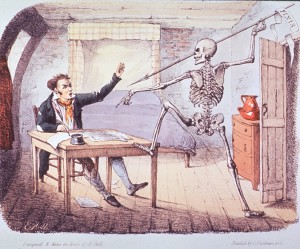I am going to make a radical suggestion that just might save the dying newspaper industry (for a while).
Fire all your columnists.
Newspapers should do the one thing they used to be good at–original reporting. Anybody can sit down and whip out an opinion piece and post it on the web (as I am doing now).
Fire all the columnists.
Use the money to hire a bunch of eager and smart young reporters from the tech generation. Given the bloated salaries of most ageing, out-of-touch columnists, the newspaper business could probably get three entry-level reporters for every fired columnist. Instead of a stupid “last hired, first fired” policy, the young reporters could keep the industry on life support for a while longer until one of those young people come up with a solution that saves the industry from itself before it collapses entirely.
(One proviso here. There are a few, too few, writers labelled as columnists who actually go out and do frequent original reporting. I’d keep them and make them get out in the field even more than they do now, because they’re actually reporters. There are also innovative reporters/live tweeters/live bloggers like Andrew Carvin @acarvin (personal website) in the US and Kady O’Malley (CBC Inside Politics blog) @kady in Canada. I’d keep them as well. I would not keep tweeters/columnists who just send out their opinions without any actual reporting).
Why fire the columnists?
One. The world wide web is full of opinionated bloggers and tweeters.
In terms of the opinion marketplace, opinion, especially ill-informed opinion, is at the market level of a t-shirt made in China and brought over to North America by the container load, dirt cheap and available in any colour you want. If opinionated columnists helped attract a newspaper audience in the 1980s, today a columnist is a penny a dozen (and we all know what’s happening to the penny).
On the other hand, a large segment of the population seems to be eager for real, on-the-scene, informed reporting. But since having columnists sit on their fat asses in offices, never going out, never even making a phone call or moving a mouse to check a fact, are, in budget terms, cheaper than actually sending reporters out in the field, newspapers are firing reporters and promoting columnists. It’s the same with political panels on television. The panels cost little, fill up air time and add almost nothing substantive to a news broadcast.
Dumb.
How many of today’s audience actually care about columnists? Last fall, I was teaching a continuing education class at a university on social media. There were about 30 students, ranging in age from 20 to 65. I mentioned the CBC and National Post’s Rex Murphy, (I know from my days producing The National’s website that Rex was quite popular then among the CBC audience). To my shock and surprise, blank stares. No one. No one in that class had ever heard of Rex Murphy, even though he hosts Cross Country Check Up, he once wrote a column for The Globe and Mail and now gives his opinion on CBC’s The National and in The National Post. An anomaly perhaps, an indication of the decline of the CBC, perhaps. But those students did talk about how they got news, yes news, from Twitter and Facebook and how links led them to the media that originated the story.
Two. The majority of columnists, left, right or middle, are completely out of touch with reality.
Most columnists today are ageing boomers, or members of Generation Gekko (the spoiled generation between the WWII Greatest Generation and the Boomers) and most haven’t had an original thought in at least a decade. Nothing proves that more, here in Canada, than the near unanimous condemnation of the student protests in Quebec by columnists in almost all the major media across this country. One has to wonder if these columnists talk to their kids (if they have kids). They rant about today’s generation of students as “spoiled brats.”
Compare that blanket condemnation with the intelligent discussions I have seen among several Facebook friends and their followers over the issues in Quebec. Even those who oppose the students stand on tuition fees and are disturbed by the marches disrupting their neighborhoods and businesses are more measured in the Facebook discussions I have seen than what you read in the columns or heard in the television news political panels.
Why read the pontification of a columnists, when you get a wider view of opinions and experiences from a thread on Facebook (where I should note, people use their real names and are known personally to at least some of the people taking part in the discussion)?
None of those columnists, when they were starting out, had to go through four or five unpaid internships to get their first paying job (and unpaid internships are not only standard practice in the media but in almost all industries that also pay their CEOs millions in salaries and bonuses). None of those columnists are burdened with life-long debt for getting a university or college education. The columnists seem to have forgotten the fear we all felt as kids at the prospect of nuclear annihilation over our heads when they dismiss as nonsense, the completely justified fears the current generation of young adults have about the future of a planet facing drastic climate change.
None of those columnists ever seem to bother to read the news wires available on their computers (or even their reporting colleagues on their own newspaper). If they did, they would know that the discontent among the current student and young adult generation is worldwide. There have been student protests in Chile over high tuition and debt for the past two years. There have been student protests across Europe, even before the debt crisis. Then there’s the Arab Spring (conditions may be different but it’s the same generation) and yes, the London riots, even the Stanley Cup riot in Vancouver, the G20 disturbances in Toronto. I’ve seen tweets and Facebook postings that students in the UK are going to adopt the Quebec students’ red square symbol in their struggle with the government of David Cameron. If it happens that would show the power of social media and the networking power of the new generation.
To quote the old song from the 60s, which I am sure most of those columnists sang in their day, “something’s happening here” but unlike a few reporters, the columnists never bother find out, they just sit at their keyboards and create “sound and fury signifying nothing.”
Even in terms of a business model, if you’re running a newspapers and you want to attract a younger audience ( the younger audience is a mantra in television, even though the executives don’t really mean it) why have your newspaper columns shit (and I meant that) almost every day on your potential next generation of customers? Yes, most newspaper readers are older (but even those are giving up on newspapers) but why ignore a potential market of millions that could save your business? Perhaps because the newspapers executive are cut from the same obsolete cloth as their columnists
To expand on this, since I returned to my old home town of Kitimat, centre of the Enbridge Northern Gateway pipeline controversy, my once high respect for the Ottawa press gallery is in free fall and now near zero. Most of the reporting on this British Columbia pipeline and tanker issue from Ottawa and Toronto, is only 20 per cent accurate, if that. (That is why I founded my own news site, Northwest Coast Energy News). Almost all of the columns on the Northern Gateway issue written east of the Rockies are so inaccurate that they are worthless.
In the old days, when Canadian newspapers actually did reporting from across the country, there would be someone out west to tell the Ottawa or Toronto columnists and their senior editors, hey this column is completely wrong. (There are only three national level reporters in Canada whose reporting can be trusted on the Northern Gateway, Mike De Souza at Postmedia, Jeffrey Jones at Reuters and Nathan Vanderklippe at The Globe and Mail and even they tend to write too much from an energy sector point-of-view. As for the energy columnists, their opinions are worth about as much as molecule of shale fracked natural gas)
The press gallery, especially the columnists, exist in an inside-the-Queensway bubble, listening to politicians, war room strategists, spin doctors and pollsters and have come to believe that is reality. It seems that to the Ottawa press gallery, the only thing that counts is electoral politics. Everything else is, to use the term from economics, a political “externality” and not worth reporting. Discontent across Canada and political turmoil around the world mean nothing, unless it can be factored in to whomever wins the next parliamentary, congressional or presidential election.
Three. Let them blog.
It is interesting that most of the columnists, many of them conservative, many hired in the 1980s, when newspapers decided that they only wanted to chase the well-heeled, upper middle class and upper class market that advertisers craved, worship the free market but are completely insulated from it, especially on newspapers that are loosing money (unlike the young people they scorn who are subject to the marketplace every day.)
So if these columnists are so in favour of the marketplace and if they are fired, as I suggest, then let them put their ideas out in the marketplace as a blog, and see if they can actually earn a decent living at it. Most won’t of course, but there are a few who do, like Andrew Sullivan. More power to those who do succeed, and perhaps a lesson for those who fail and who are currently condemning today’s students and young journalists for their struggles.
Four. The paywall issue.
Newspapers are rushing to create paywalls. Some reporters say paywalls are needed to produce good journalism.
Wrong. We’re getting into a chicken and egg argument here. Paywalls aren’t going to work and not because the internet has worked on free information since 1993. Paywalls won’t work for the simple reason that 80 per cent of newspapers today are not producing anything worth paying for whether it’s online or mobile; they’re not producing anything even worth paying for and picking up the dead tree printed edition. Many newspapers have already fired most of their reporters and photographers or those reporters and photographers have got fed up and quit or taken early or full retirement. Now the newspapers are going to put up a paywall, with even fewer staff doing the reporting and expect that public to pay for that diminished product?
Dumb.
With wire service reports available for free on sites that don’t have paywalls, why then fill up your news site or newspaper with wire reports that people can get elsewhere for nothing and then expect them to pay for it? As well as the wire services there are now the citizen newspapers, from paper.li. I subscribe to a half dozen daily feeds as a sort of wire service for Northwest Coast Energy News and often those compilations give me three or four sources on a new story, so if a story is behind a paywall, there are always alternatives. As well as my own original content, I use Storify to keep my readers up-to-date with issues I can’t cover myself. (Example here)
Dumb.
One has to ask “what are they thinking” in the media’s ego-driven, consultant-plagued corporate board rooms? (Consultant-plagued because all the media companies are repeating the same failed strategies over and over instead of trying something innovative). Why would anyone under the age of 35, in these days of austerity, whip out their credit card and pay to be told by a columnist who hasn’t picked up a phone to check a fact since they were first appointed around 1990 that these readers/viewers are spoiled brats and that their worries about the future are of no consequence.
Dumb.
As I said above, with so much opinion available for free on the web, why pay for the rants of the 95 per cent of columnists whose writing isn’t worth it and only serves to raise your blood pressure (no matter where you are on the political spectrum).
Hire the kids, lots of them
On the other hand for the same current limited budgets, if newspapers got rid of the columnists and hired a whole generation of new, young reporters, with guidance from some open minded senior editors (and checked by good copy editors—you really need to bring copy editors back, firing copy editors is another media corporate stupidity), that would bring “new blood” to use the cliche to the news web sites and news pages. We would see original reporting on issues that everyone, not just the younger generation, care about. A century ago, reporters started in the business right out of high school around 16 to 18 and the newspapers, of the day used their energy to create audience and profits. Even with today’s demand for higher education, a 25-year-old reporter has the energy and eagerness to shake things up. It is possible, perhaps, that they then could produce stories that would be worth paying for, whether by attracting advertisers or even making a news site so good that people might actually penetrate the paywall with their credit cards.
Dunsel
To use a term from one of my generation’s favourite TV shows, Star Trek, The Original Series, in 2012, a columnist on a newspaper is a Dunsel. (Dunsel is a term used by midshipmen in the 23rd century to describe a part which serves no useful purpose. From Memory Alpha, the Star Trek wiki. )
Getting rid of columnists is just an idea, one of many as the news media, an essential part of any free and democratic society, struggles to to survive and find a way to pay to produce its product. There are many blogs and reports out there on the issue of media survival, too many to link to. My idea of getting rid of columnists would just be one stopgap measure.
Unfortunately most media executives these days are also Dunsels, earning huge salaries, running around believing it’s still 1985 and rejecting any new ideas from no matter what source (except expensive reports from their consultants) and thus serving no useful purpose, so it is likely that the newspapers’ downward spiral will continue until nothing is left.
Related See Jeff Fraser’s piece If they build it, will they pay? on the Canadian Journalism Project site where he says the New York Times paywall is working, because the Times is emphasizing quality original reporting and most paywalled papers are not emphasizing quality reporting.



